外研版七下Unit1《Whatareyougoingtodoattheweekends》word学案
外研版英语七年级下册Module 3 Unit 1 What are you going to do
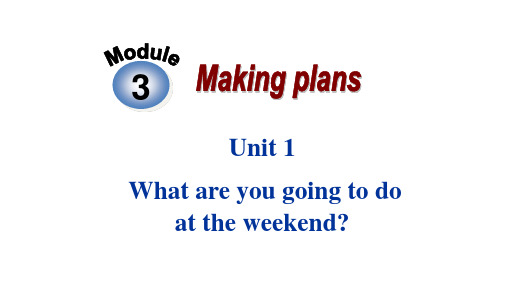
课前预习
学习目标 1.能够正确使用本单元单词和短语; 2.通过询问他人周末计划情况,培养学生关心他人的好 习惯;通过介绍自己的活动计划,解决学生生活中缺少计划性 的问题。
重点单词 请在课文中找出下列单词并根据课本的单词表尝试着写出 所缺的单词或音标。 名词(n.) 1.________ /'pɪknɪk/ 野餐 2.________ /'haʊsˌwɜːk/ 家务劳动
常作表语或定语
讲解:
Don’t be silly! 别傻了! (常用于口语中,表示劝导或抚 慰对方,很多时候并不含贬义。)
例句:
Don’t be silly! You can’t find it.
adj. 极好的
例句:
I think it’s going to be a fantastic weekend.
3
Unit 1 What are you going to do
at the weekend?
外研·七年级下册
Module 3 Making plans Unit 1 What are you going
to do at the weekend?
复习;练习
讲解:
是“动词+副词”型短语,后接名词作宾语时,名词放在over之前 或之后皆可;后接代词作宾语时,代词要放在go与over之间。
pron. 没有人
讲解:
不定代词:没有人。作主语时,谓 语动词用第三人称单数形式。
例句:Nobody can hear you.
拓展:nobody还可作名词,意为
“小人物”。
例句:She isn’t a nobody but a
great film star.
外研社七年级英语下Unit 1 What are you going to do at the weekend?
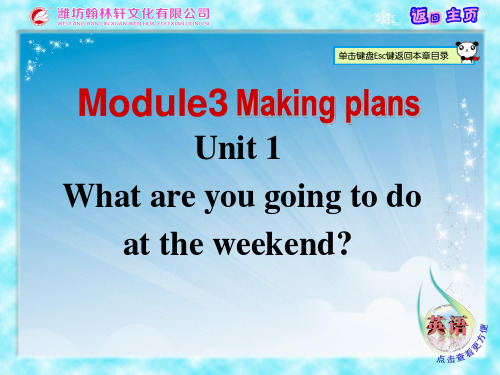
morning
Saturday Sunday
afternoon evening morning afternoon evening
You Check email do homework
Your partner
Quiz
play table tennis
What are you going to do ? I am going to play table tennis.
play the piano
What is he going to do this evening? He is going to play the piano this evening .
useful expressions
Words: picnic, housework, on, else, nobody, at, nothing, weekend, fantastic
Phrases: go over, have a piano lesson, help with..., check my email, see a movie, have a picnic, at the weekend, do my homework, stay at home. sentences: What are you going to do at the weekend? I’m going to… Would you like to join us ? Yes, I’d love to.
alone else fantastic nothing silly
Betty: What are your plans for next weekend, Lingling? Lingling: (1)_N_o_t_h_i_n_g. I don’t have any plans. Betty: Are you going to spend it (2) _a_lo_n_e_ at home? Lingling: Well… What are you going to do? Betty: Tony and I are going to have a picnic in the park. We’re going to have a (3)_fa_n_t_a_s_ti_ctime. Are you going to come? Lingling: I’m not sure. Betty: Don’t be (4)_si_l_ly_! What (5)_el_s_e are you going to do?
外研版七年级下册ModuleUnitWhatareyougoingtodoattheweekend【
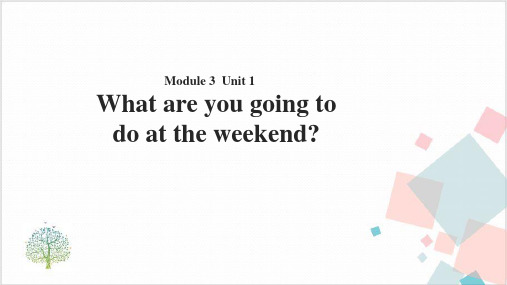
(教学提纲)外研版七年级下册Modul eUnitW hatare yougoi ngtodo atthew eekend 【实用 版】-p pt下载 1【优 质公开 课推荐 】
have a picnic
野餐
(教学提纲)外研版七年级下册Modul eUnitW hatare yougoi ngtodo atthew eekend 【实用 版】-p pt下载 1【优 质公开 课推荐 】
(教学提纲)外研版七年级下册Modul eUnitW hatare yougoi ngtodo atthew eekend 【实用 版】-p pt下载 1【优 质公开 课推荐 】
get up 起床
(教学提纲)外研版七年级下册Modul eUnitW hatare yougoi ngtodo atthew eekend 【实用 版】-p pt下载 1【优 质公开 课推荐 】
(教学提纲)外研版七年级下册Modul eUnitW hatare yougoi ngtodo atthew eekend 【实用 版】-p pt下载 1【优 质公开 课推荐 】
stay in bed
待在床上
(教学提纲)外研版七年级下册Modul eUnitW hatare yougoi ngtodo atthew eekend 【实用 版】-p pt下载 1【优 质公开 课推荐 】 (教学提纲)外研版七年级下册Modul eUnitW hatare yougoi ngtodo atthew eekend 【实用 版】-p pt下载 1【优 质公开 课推荐 】
Module 3 Unit 1
What are you going to do at the weekend?
Lead in
外研版英语七年级下册Module 3 Unit 1《What are you going to do

外研版英语七年级下册Module 3 Unit 1《What are you going to do at the weekend》教学设计1一. 教材分析外研版英语七年级下册Module 3 Unit 1的主题是关于周末计划的询问和回答。
本节课的主要内容是让学生学会使用“What are you going to do at the weekend?”来询问他人的周末计划,并能用“I’m going to…”的句型回答。
教材通过不同的情境,让学生在实际语境中学习并掌握这一句型。
二. 学情分析七年级的学生已经掌握了基本的英语语法和词汇,对日常交流的语言功能有一定的了解。
他们在学习过程中需要将已学的知识运用到实际情境中,通过实践活动来提高语言运用能力。
同时,学生对新鲜事物充满好奇,善于模仿和探究,通过互动和合作可以更好地掌握语言知识。
三. 教学目标1.知识目标:学生能够听懂、会说、会读“What are you going to do atthe weekend?”和“I’m going to…”句型,并能用这两个句型进行简单的交流。
2.能力目标:学生能够在真实情境中运用所学知识进行交流,提高他们的语言运用能力。
3.情感目标:培养学生对周末活动的兴趣,激发他们学习英语的积极性。
四. 教学重难点1.重点:学生能够掌握并运用“What are you going to do at theweekend?”和“I’m going to…”句型进行交流。
2.难点:学生能够在实际情境中正确运用这两个句型,并能够根据实际情况进行适当的创造性的表达。
五. 教学方法采用任务型教学法,通过不同的任务让学生在实际语境中学习并运用所学知识。
同时,运用分组合作学习法,让学生在小组活动中互相交流、互相学习,提高他们的语言运用能力。
六. 教学准备1.教师准备:准备好相关的教学材料,如PPT、图片、卡片等。
2.学生准备:学生需要预习相关的词汇和语法知识。
七年级英语下册Unit 1 What are you going to do at the weekend教案 新外研版
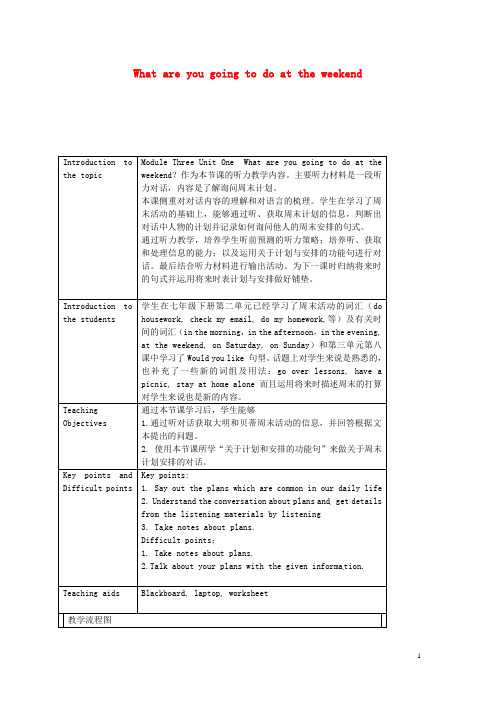
What are you going to do at the weekend 的句式并运用将来时表计划与安排做好铺垫。
and get3. Ta2.Talk about your plans with the given informa tion.Learn the new words and expressListen an d tick the plans.Brainstorm the answers.to listen to and questions by using the k5th List eningblackboard.outthe expressions fo rWeeken dBetty: What are your plans for next w eekend, Lingling?Lingling: 1)___________. I don’t ha ve any plans.Betty: Are you going to spend it 2) __________________ at home?Lingling: Well,…what are you going to do?Betty: Tony and I are going to have a picnic in the park. We’re going to have a3)_________ time. Are you going to come?Lingling: I’m not sure.Betty: Don’t be 4)__________! What 5)__________ are you going to do?教学反思:通过听力教学,培养学生听前预测的听力策略;培养听、获取和处理信息的能力;以及运用关于计划与安排的功能句进行对话。
最后结合听力材料进行输出活动。
为下一课时归纳将来时的句式并运用将来时表计划与安排做好铺垫。
外研版新标准英语七年级下册M3 Unit 1 What are you going to do at the weekend英文教案

Unit 1 What are you going to do at the weekend?(一)【教学目标】:1 功能:计划、打算、意图的表达与询问。
2 语法: be going to 的意义和用法。
3 语音:含有be going to 的句子的读音及L 系列辅音组合的发音。
4任务:(1) be going to 句型介绍自己对一周学习或其他活动的计划安排。
(2) 词汇:1 plan 计划 2 revise 温习;复习 3 picnic 夜餐 4 test 测试(二) 重点:1一般将来时的定义:表示打算、计划、准备、将要做某事。
结构:be going to +动词原形例如:What are you going to do this afternoon?你今天下午打算做什么?2because引导的原因状语从句3 动词词组A teaching plan for Unit 1,Module 3一、Teaching materials:Unit 1 What are you going to do at the weekend? (Module 3 Plans)二、Targets for this period:To understand conversations about planTo get special information from the listening passageTo talk about one’s plan on weekend三、Key points:Key vocabulary—plan to do something, revise for one’s test, have a picnic/part y, have a piano lesson, do some sightseeing, go sightseeing/shopping/cycling, cook dinner, go to the beach, stay in bedKey structures—What is he / she/ your friend going to do on weekend?What are you / they going to do on weekend?四、Teaching methods:Interactive approach五、Teaching aidsTape recorder, OHP六、Teaching arrangements:Step One Lead-in1. Students talk about the following questions in small groups:1) Do you like weekend?2) Why do you like weekend?3) What do you usually do on weekend?2. Show some new phrases and ask the students to remember themplan to do something, revise for one’s test, have a picnic/party, have a piano lesson, do some sightseeing, go sightseeing/shopping/cycling, cook dinner, go to the beach,stay in bedStep Two Presentation1. Show the sentence structure “be going to” with examples and pictures.----What is he going to do? ----He is going to…(将要做某事)----He is going to check his email.----He is going to do his homework.2. Students look at more pictures and make sentences.1) ----What is she going to do?----She is going to have a birthday party / cook dinner / go to Sydney / take the plane / take the boat.2) ----What are they going to do?----They are going to eat dinner / have a party / have a picnic / go to the beach /watch TV / play soccer / go to the theater / buy some clothes / play volleyball.3) ----What is he going to do?----He is going to study for a test / have a piano lesson / go sightseeing / go cycling / play volleyball / play basketball / go swimming / go shopping / go fishing Step Three Listening (Activity 3)1. Students listen to the tape and choose the correct answers. (Activity 4)1) What’s Daming going to do on Saturday morning?D He is going to check his email.H He is going to do his homework.2) What’s Betty going to do on Saturday afternoon?G She is going to buy clothes.3) What’s Betty and Daming going to do on Saturday evening?C They are going to go to the party.4) What are Daming, Betty, Tony and Lingling going to do on Sunday afternoon?A They are going to have a picnic.5) What’s Daming going to do on Sunday morning?F He is going to get up early.I He is going to play table tennis.6) What’s Betty going to do on Sunday morning?B She is going to stay in bed.E She is going to revise for her test.2. Students listen again and complete the diary. (Activity 7)Daming BettySaturday Morning Check email Do homeworkAfternoon Have a piano lesson Buy some clothesEvening Go to a party Listen to some music Go to a party Listen to some music Sunday Morning Get up early Play table tennis Stay in bed Revise for her test Afternoon Meet Lingling and Tony in the park Have a picnic Meet Lingling and Tony in the park Have a picnicevening3. Students ask and answer in pairs according to the diary.e.g. ----What’s Daming going to do on Saturday morning?----He’s going to check his email and do h is homework.Step Four To practice reading aloud the conversation in groups of two.Step Five Detail explanation (Activity 3)1. Would you like to come? = Do you want to come?2. revise sth = go over sthe.g. I must revise my English notes for my exam.Step Six To act out the conversation.Step Seven To listen and repeat (Activity 5&6)Step Eight Summary: be going to do sth. 表示自己打算或计划做某事.be 的形式要根据主语来确定。
七年级英语下册 Unit 1 What are you going to do at the weekends教案1 新版外研版
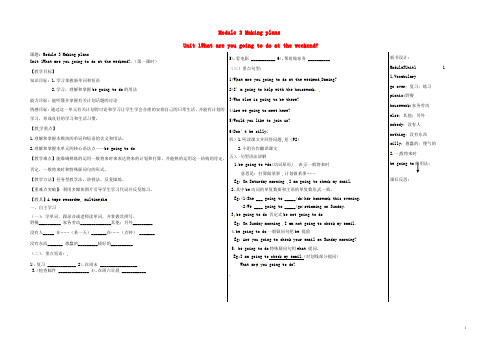
Module 3 Making plansUnit 1What are you going to do at the weekend?课题: Module 3 Making plansUnit 1What are you going to do at the weekend?.(第一课时)【教学目标】知识目标:1.学习掌握新单词和短语2.学习,理解和掌握be going to do的用法能力目标:能听懂并掌握有关计划话题的讨论情感目标:通过这一单元有关计划得讨论和学习让学生学会合理的安排自己的日常生活,并能有计划的学习,养成良好的学习和生活习惯。
【教学重点】1.理解和掌握本模块的单词和短语的含义和用法。
2.理解和掌握本单元的核心语法点——be going to do【教学难点】能准确熟练的运用一般将来时来表达将来的计划和打算,并能熟的运用这一结构的肯定,否定,一般将来时和特殊疑问句的形式。
【教学方法】任务型教学法,讲授法,反复操练。
【重难点突破】:利用多媒体图片引导学生学习代词并反复练习。
【教具】A tape recorder, multime dia一、自主学习(一):学单词,跟录音或老师读单词,并掌握其拼写。
野餐__________ 家务劳动______________其他;另外_________没有人_____ 在……(某一天)_______在……(点钟) _______没有东西_______ 愚蠢的_________极好的__________(二)、重点短语:1).复习 _____________ 2).在周末 _________________3.)检查邮件 ______________ 4).在周六早晨 ___________ 5).看电影 ___________ 6).帮着做家务 __________(三)重点句型:1)What are you going to do at the weekend,Daming?2)I’m going to help with the housework.3)Who else is going to be there?4)Are we going to meet here?5)Would you like to join us?6)Don’t be silly!四)1.听读课文并回答问题,见(P2)2.小组合作翻译课文五).句型语法讲解1.be going to +do(动词原形) 表示一般将来时意思是:打算做某事 ,计划做某事……Eg: On Saturday morning ,I am going to check my email.2.其中be动词的单复数要和主语的单复数形式一致。
外研版英语七年级下册Module 3 Unit 1《What are you going to do

外研版英语七年级下册Module 3 Unit 1《What are you going to do at the weekends》教学设计一. 教材分析外研版英语七年级下册Module 3 Unit 1的主题是关于周末计划的询问和回答。
本节课的主要内容是让学生能够熟练运用一般将来时态,用“What are you going to do at the weekends?”和“I’m going to…”的结构进行对话,询问并回答他人的周末计划。
教材通过丰富的情境和真实的对话,帮助学生理解和运用目标语言,提高他们的语言交际能力。
二. 学情分析七年级的学生已经掌握了基本的日常英语对话,对一般将来时态也有了一定的了解。
但他们在实际运用中,可能会对一些复杂的情境和表达方式感到困难。
因此,在教学过程中,教师需要关注学生的个体差异,因材施教,引导他们积极参与课堂活动,提高他们的语言运用能力。
三. 教学目标1.知识目标:学生能够掌握一般将来时态的构成和用法,理解并能熟练运用“What are you going to do at the weekends?”和“I’m going to…”的结构进行对话。
2.能力目标:学生能够在真实情境中,运用目标语言进行交流,提高他们的语言交际能力。
3.情感目标:培养学生热爱生活,珍惜时间,合理安排周末时间的良好习惯。
四. 教学重难点1.重点:学生能够熟练运用一般将来时态,用“What are you going todo at the weekends?”和“I’m going to…”的结构进行对话。
2.难点:学生能够在真实情境中,灵活运用目标语言,进行交流。
五. 教学方法1.情境教学法:通过设置真实的周末生活情境,让学生在情境中感知和运用目标语言。
2.交际法:鼓励学生积极参与课堂对话,提高他们的语言交际能力。
3.任务型教学法:通过完成小组任务,让学生在实践中运用目标语言。
外研版英语七年级下册Unit1Whatareyougoingtodoattheweekend课后练习
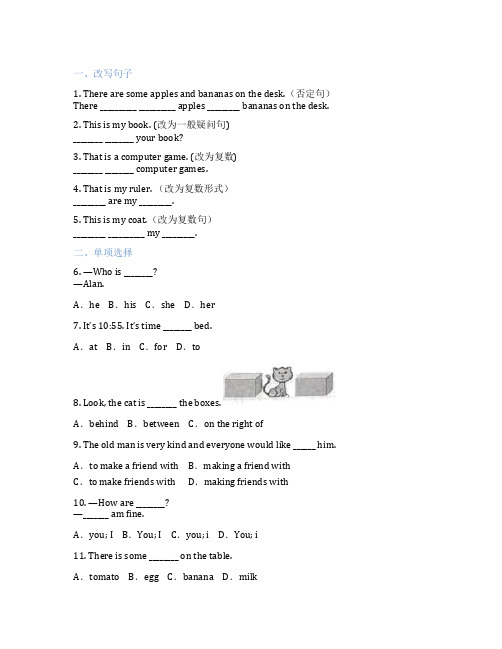
一、改写句子1. There are some apples and bananas on the desk.(否定句)There __________ __________ apples _________ bananas on the desk.2. This is my book. (改为一般疑问句)________ ________ your book?3. That is a computer game. (改为复数)________ ________ computer games.4. That is my ruler. (改为复数形式)_________ are my _________.5. This is my coat.(改为复数句)_________ __________ my _________.二、单项选择6. —Who is ________?—Alan.A.he B.his C.she D.her7. It’s 10:55. It’s time ________ bed.A.at B.in C.for D.to8. Look, the cat is ________ the boxes.A.behind B.between C.on the right of9. The old man is very kind and everyone would like ______ him. A.to make a friend with B.making a friend withC.to make friends with D.making friends with10. —How are ________?—_______ am fine.A.you; I B.You; I C.you; i D.You; i11. There is some ________ on the table.A.tomato B.egg C.banana D.milk12. We usually have the first lesson ________ eight o’clock ________ the morning. A.In; at B.on; in C.in; on D.at; in13. Is the bank ________ the park and the school?A.next B.between C.front D.in14. ________ is a girl. ________ name is Li Fen.A.Her; Her B.She; She's C.Her; She D.She; Her15. —Would you like ________ noodles for breakfast?—Sure, I like ________ noodles very much for breakfast.A.have; having B.having; having C.to have; having D.have; have三、句型转换16. That is his friend.(改为复数)____ ____ his ____.17. What’s this? (将句子变为复数句)____________________________________________18. We have some festivals in the USA.(就画线部分提问)_____________________________________19. This is my father and this is my mother.(改为同义句)_____ _____ my_______.20. There is something wrong with this machine. (改为否定句)There’s ________ ________ with this mac hine.四、单词拼写21. My schoolbag is b________ the door.22. My grandfather and grandmother are ______ the first photo.23. However, the goose looked angry and tried to drive him away. He could do ____ (没有什么) but leave.24. Our teacher, Mr Li is in the teacher s’ ________.25. Tom is a movie ________ (迷). He goes to the movies every weekend.五、用所给单词的正确形式填空26. There aren’t ________ (some) computers on our desks.27. _______ are my sisters and ________ is my mother. (that/those)28. There is no ________ (tea) in the cup.29. That girl’s name is Helen. ________ comes from Nanjing. We all love________. (she)30. It is ________ to fly kites in the park. (funny)六、完成句子31. 这把在桌子上的小钥匙不适合任何的门。
2013春外研版七下Unit1《What are you going to do at t
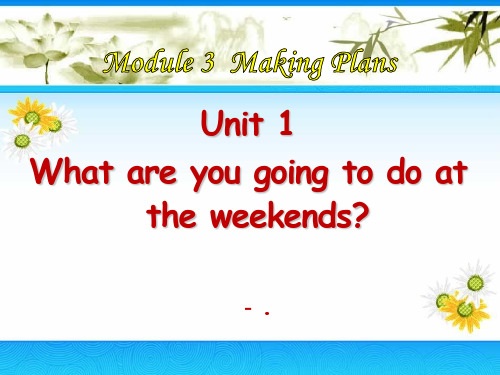
the next day
tomorrow morning
What are they going to do?
They are going to watch TV.
They are going to play volleyball.
1. I’m going to meet my friend Linda at the w______.2. We’re going to have a p____ next week.3. What are your p____ for this summer holiday?4. He looked f_______!5. She was acting s___.6. I’m busy now and I’m going to r_____for my test.7. Daming is going to play table tennis w___some friends.8. Lucy is going to c_______her email in the morning.
二、翻译
Listen and match the words and expression from Box A with the word and expressions from Box B.
check go overhave see help have
a moviea piano lesson a picnic lessons my email with the housework
eekend
icnic
lans
antastic
外研版英语七年级下册M3U1 What are you going to do at the weekend精品课件
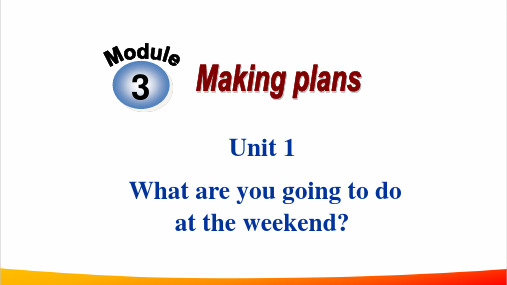
查收电子邮件 复习功课 上钢琴课 看电影 帮忙做家务 去野餐;举行野餐
2. Match the expression in Activity 1 with the pictures.
go over lessons
help with the housework
see a movie check my email have a piano lesson have a picnic
复习;练习
go over
野餐 n.
picnic学科网
家务劳动 n.
housework
在……的时候 prep. on
其他;另外 adv. else
Words and expressions
没有人 pron.
nobody
在……点钟 prep.
at学科网
没有什么,没有东西 pron.
愚蠢的,傻气的 adj.
• 一、 汉译英 • 1. 在星期六早晨 __2. 做家务 ________ • 3. 下个星期 _____4. 在2008年 ________ • 5. 在周末 _____6. 上钢琴课 ________ • 7. 看电影 _____8. 卧床 ________ • 9. 野餐 ______10. 听音乐 ________ 11. 聚会 ______12. 查看邮件 ________
idea,have a picnic,meet, plan,help with,stay at
1. I usually ______the housework at home. 2. The students are going to ______ next week. 3. Ella has a good _____about his summer holiday. 4. I'm going to make a __for my study next year. 5. I'm so busy that I have no time to ____ my grandparents at the station. 6. Betty is going to _ home and watch party She is going to have a birthday party.
2013春外研版七下Unit1《What are you going to do at t
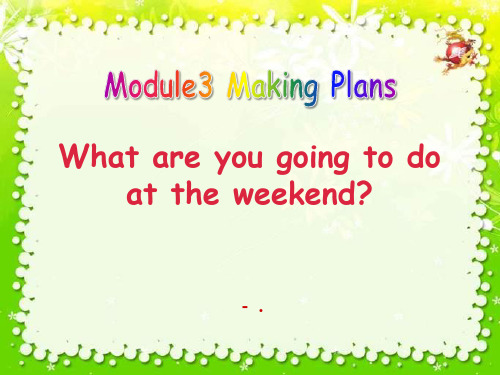
4. I’m going to stay at home alone in the morning. and I’m going to go over my lessons. 我打算早上呆在家里,并为复习功课。
friends.
5. Lucy is going to c heck her email in the morning.
1. What are you going to do at the weekend? 你打算在周末做什么?
2. On Saturday evening, I’m going to ቤተ መጻሕፍቲ ባይዱo to a party at a friend’s home. 我打算在星期六晚上去朋友家里的晚会。
3. have 4. see 5. help 6. have
3. a picnic 4. lessons 5. my email 6. with the homework
Step 4 : Let’s write
get up early
have a piano lesson check my email
1.肯定句: 主语+ be going to +动词原形 1) 我打算在早上查看一下电子邮件。
I _a_m__g_o_i_n_g_t_o_c_h_e_c_k my email in the morning. 2) 他打算在周末去野餐。
He __i_s_g_o_in__g_t_o_h_a_v_e__a_p_i_c_n_ic_ at the weekend.
c. They’re going to meet in the park at one o’clock. d. He’s going to check his email.
春外研版七下Unit1Whatareyougoingtodoattheweekends2
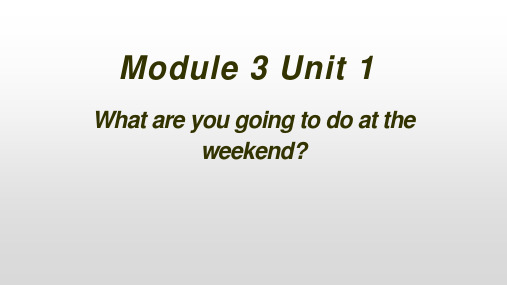
e.g. at twelve o'clock / at noon
at night
at Christmas
at this moment
● in 泛指一天的上午、下午或晚上; “in + 时间段”表示将来的时间,“在...之后”
in + 大时间、大地点
e.g. in the morning/afternoon/evening
She is alone at home. 她独自一人在家。
alone 可做表语,也可做副词,独自地,只是陈述客 观事实,不具有感情色彩。
e.g. I am alone in the house.
lonely作形容词,有浓厚的感情色彩,“孤独”、“寂 寞”。
也可表示地方 “荒凉的,人烟稀少的”
(e1. )gT. haoluognehlyI vwillaasg_ae_lo_一n_e_个_偏, 僻I d的id村n庄't feel l_o_n_e_ly_. (2)I felt _l_o_n_e_ly__at the _lo_n_e_l_y_village. (3)The children stays at home __a_l_o_n_e____.
Module 3 Unit 1
What are you going to do at the weekend?
重点词语
●go over lessons 复习功课 ●have a picnic 野餐 ●help with the housework 帮助做家务 ●see a movie 看电影 ●check my email 查看电子邮件 ●have a piano lesson 上钢琴课
外研版七年级下Unit1《What are you going to do at the weekends》ppt课件4
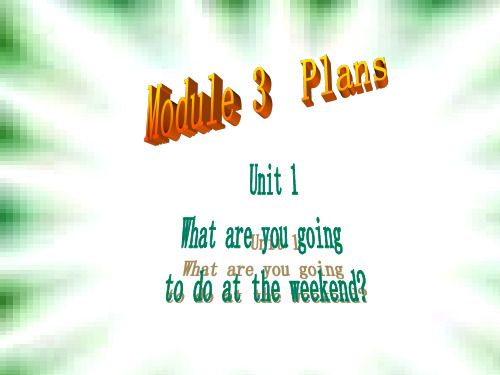
• Listen to the dialogue in Activity3 and answer the questions .
1.What is Daming going to do on Saturday morning?
He is going to check his email and then do his homework.
2.What is Betty going to do on Sunday afternoon? She is going to have a picnic.
Listen and repeat. 1.—What’s he going to do? — He’s going to do his homework.
B: They He is going are going to …. to ….
revise for his test check his email
Байду номын сангаас
go skiing
go cycling
visit the zoo
make a snowman play basketball
play table tenni
What are you going to do at the weekend?
I’m going to stay at home.
What are you going to do at the weekend?
I’m going to buy some clothes.
What are you going to do at the weekend?
have a picnic
Write the phrases in Activity 1 under the pictures.
外研版初一下册英语 Unit 1 What are you going to do at the weekend? 教案(教学设计)
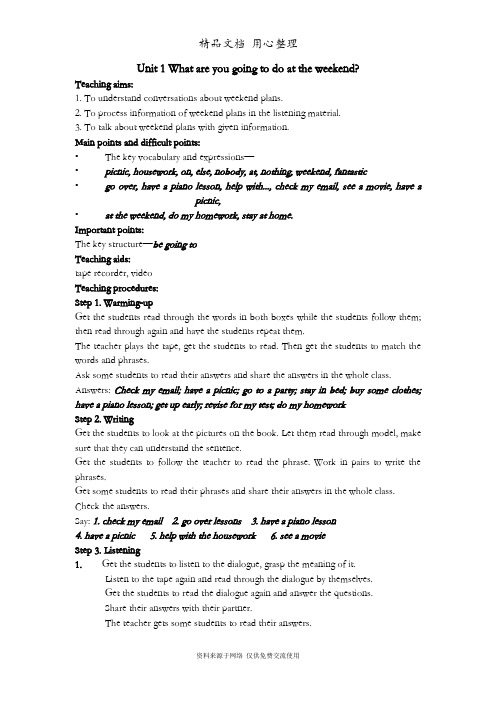
Unit 1 What are you going to do at the weekend?Teaching aims:1. To understand conversations about weekend plans.2. To process information of weekend plans in the listening material.3. To talk about weekend plans with given information.Main points and difficult points:•The key vocabulary and expressions—•picnic, housework, on, else, nobody, at, nothing, weekend, fantastic•go over, have a piano lesson, help with..., check my email, see a movie, have apicnic,•at the weekend, do my homework, stay at home.Important points:The key structure—be going toTeaching aids:tape recorder, videoTeaching procedures:Step 1. Warming-upGet the students read through the words in both boxes while the students follow them; then read through again and have the students repeat them.The teacher plays the tape, get the students to read. Then get the students to match the words and phrases.Ask some students to read their answers and share the answers in the whole class. Answers: Check my email; have a picnic; go to a party; stay in bed; buy some clothes; have a piano lesson; get up early; revise for my test; do my homeworkStep 2. WritingGet the students to look at the pictures on the book. Let them read through model, make sure that they can understand the sentence.Get the students to follow the teacher to read the phrase. Work in pairs to write the phrases.Get some students to read their phrases and share their answers in the whole class. Check the answers.Say: 1. check my email 2. go over lessons 3. have a piano lesson4. have a picnic5. help with the housework6. see a movieStep 3. Listening1. Get the students to listen to the dialogue, grasp the meaning of it.Listen to the tape again and read through the dialogue by themselves.Get the students to read the dialogue again and answer the questions.Share their answers with their partner.The teacher gets some students to read their answers.Check the answers.Answers:1. He’s going to check his email and do his homework.2. She’s going to see a movie.3. Lingling.4. They are going to meet in the park.2. 知识点讲解做一些一般将来时练习(be going to do sth.句型)Step 4. PracticeUsing the words to complete the conversation.(4)Betty: What are your plans for next weekend, Lingling?Lingling: (1)_______. I don’t have any plans.Betty: Are you going to spend it (2) _____ at home?Lingling: Well, … what are you going to do?Betty: Tony and I are going to have a picnic in the park.We’re going to have a (3)_______ time. Are you going to come? Lingling: I’m not sure.Betty: Don’t be (4)____! What (5)___ are you going to do?Answers:Check the answers.Nothing alone fantastic silly elseStep 5. Listening and repeatThe teacher plays the tape and asks the students to follow to read.Play the tape again, pausing for them to repeat. They should do this chorally as a whole class. In groups and individually.Put them in pairs to practice. Encourage them to be critical and help each other get the pronunciation right.Circulate and monitor their production.Step 6. ListeningThe teacher plays the tape and asks the students to follow to read.Play the tape again, pausing for them to repeat. They should do this chorally as a whole class.Put them in pairs to practice the pronunciation of /ai/, /i/ /i:/ . Pay attention to the letter y in some words, like buy, my.Ask some students to read the words. Correct their mistakes.Circulate and monitor their production.Step 7. PracticeGet the students to read through the examples so that the students know what todo.Say:A: What are you going to do on Saturday morning?B: I’m going to check my email and do my homeworkGet the students to practice the example in pairs. And ask some groups to read.Get the students to finish the board.Step 8. Writing and answeringGet the students to ask and answer.Say:What are you going to do at the weekend?What is your mother going to do at the weekend?Step 9. Oral workIn groups, talk about what your classmates are going to do at the weekend.Choose one or two to give a report to see which is better.Step 10. Writing workWrite a short passage to describe what your father/mother is going to do on Su。
新外研版英语七年级下册Module3Unit1Whatareyougoingtodoatthewee
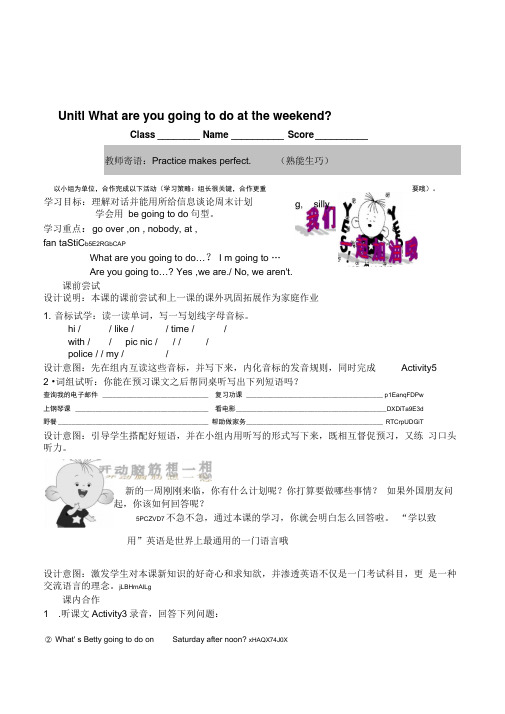
Unitl What are you going to do at the weekend?Class ________ Name __________ Score __________ 教师寄语:Practice makes perfect. (熟能生巧)以小组为单位,合作完成以下活动(学习策略:组长很关键,合作更重学习重点:go over ,on , nobody, at ,fan taStiC b5E2RGbCAPWhat are you going to do…? I m going to …Are you going to…? Yes ,we are./ No, we aren't.课前尝试设计说明:本课的课前尝试和上一课的课外巩固拓展作为家庭作业1. 音标试学:读一读单词,写一写划线字母音标。
hi / / like / / time / /with / / pic nic / / / /police / / my / /设计意图:先在组内互读这些音标,并写下来,内化音标的发音规则,同时完成Activity52 •词组试听:你能在预习课文之后帮同桌听写出下列短语吗?查询我的电子邮件_______________________________ 复习功课________________________________________ p1EanqFDPw上钢琴课_______________________________________ 看电影____________________________________________ D XDiTa9E3d野餐____________________________________________ 帮助做家务________________________________________ RTCrpUDGiT设计意图:引导学生搭配好短语,并在小组内用听写的形式写下来,既相互督促预习,又练习口头听力。
外研七下Unit1《What are you going to do at the weekends》word案
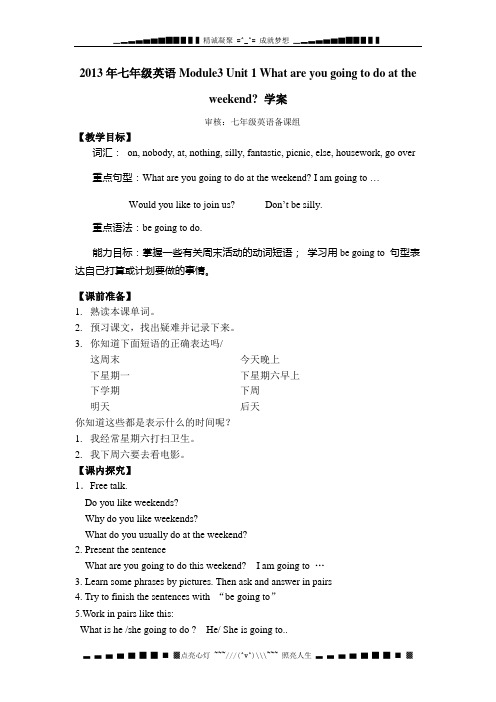
2013年七年级英语Module3 Unit 1 What are you going to do at theweekend? 学案审核:七年级英语备课组【教学目标】词汇:on, nobody, at, nothing, silly, fantastic, picnic, else, housework, go over 重点句型:What are you going to do at the weekend? I am going to …Would you like to join us? Don’t be silly.重点语法:be going to do.能力目标:掌握一些有关周末活动的动词短语;学习用be going to 句型表达自己打算或计划要做的事情。
【课前准备】1.熟读本课单词。
2.预习课文,找出疑难并记录下来。
3.你知道下面短语的正确表达吗/这周末今天晚上下星期一下星期六早上下学期下周明天后天你知道这些都是表示什么的时间呢?1.我经常星期六打扫卫生。
2.我下周六要去看电影。
【课内探究】1.Free talk.Do you like weekends?Why do you like weekends?What do you usually do at the weekend?2. Present the sentenceWhat are you going to do this weekend? I am going to …3. Learn some phrases by pictures. Then ask and answer in pairs4. Try to finish the sentences with “be going to”5.Work in pairs like this:What is he /she going to do ? He/ She is going to..What are they going to do? They are going to …6.Listen and finish Activity 1 , then finish activity 2.7. Listen and answer.What are they going to do on Saturday afternoon?8. Read and answer the questions.9.Read after the tape10. Finish activity 411.Pronunciation12. Speaking. Ask your partner’s plan for this Saturday.【课后巩固】一、写出下列短语或句子。
- 1、下载文档前请自行甄别文档内容的完整性,平台不提供额外的编辑、内容补充、找答案等附加服务。
- 2、"仅部分预览"的文档,不可在线预览部分如存在完整性等问题,可反馈申请退款(可完整预览的文档不适用该条件!)。
- 3、如文档侵犯您的权益,请联系客服反馈,我们会尽快为您处理(人工客服工作时间:9:00-18:30)。
2013年七年级英语Module3 Unit 1 What are you going to do at the
weekend? 学案
审核:七年级英语备课组
【教学目标】
词汇:on, nobody, at, nothing, silly, fantastic, picnic, else, housework, go over 重点句型:What are you going to do at the weekend? I am going to …
Would you like to join us? Don’t be silly.
重点语法:be going to do.
能力目标:掌握一些有关周末活动的动词短语;学习用be going to 句型表达自己打算或计划要做的事情。
【课前准备】
1.熟读本课单词。
2.预习课文,找出疑难并记录下来。
3.你知道下面短语的正确表达吗/
这周末今天晚上
下星期一下星期六早上
下学期下周
明天后天
你知道这些都是表示什么的时间呢?
1.我经常星期六打扫卫生。
2.我下周六要去看电影。
【课内探究】
1.Free talk.
Do you like weekends?
Why do you like weekends?
What do you usually do at the weekend?
2. Present the sentence
What are you going to do this weekend? I am going to …
3. Learn some phrases by pictures. Then ask and answer in pairs
4. Try to finish the sentences with “be going to”
5.Work in pairs like this:
What is he /she going to do ? He/ She is going to..
What are they going to do? They are going to …
6.Listen and finish Activity 1 , then finish activity 2.
7. Listen and answer.
What are they going to do on Saturday afternoon?
8. Read and answer the questions.
9.Read after the tape
10. Finish activity 4
11.Pronunciation
12. Speaking. Ask your partner’s plan for this Saturday.
【课后巩固】
一、写出下列短语或句子。
查收邮件_________________ 复习功课_________________ 帮忙做家务_________________ 在周六早上________________ 上钢琴课_________________ 野餐_________________ 还有谁_________________ 一个极好的周末_________________ 独自呆在家_________________ 别傻了_________________
你想加入我们吗?__________________________________
你周末打算干什么?__________________________________
你周末有什么计划吗?__________________________________
我们打算一点钟在公园见面。
__________________________________
二、用be going to完成下面的句子。
1. He _______________ (go) over lessons next Sunday.
2. I _________________ (buy) some clothes tomorrow.
3. We ______________ (play) tennis next Saturday afternoon.
4. Tom and his friends ___________ (have) a picnic the day after tomorrow?
5. They______________ (have) a birthday party next Friday evening.
6. What _______ you __________ (do) tomorrow?
7.______ Jim’s mum ____________(make) a cake for him?
8.Who____________ (fly) a kite this weekend?
9. Where ______ he___________(meet)?
10. ______ they __________ (take) a plane to Beijing this Sunday?
2013年七年级英语Module3 Unit 2 We are going to cheer the players?
学案
审核:七年级英语备课组
【教学目标】
一、单词:fan, shirt, hope, win, myself, May, late, something, walk, country, second, fun, cheer, during, collect, litter, camp, sightseeing, beach. forward
二、短语:make friends, enjoy oneself, May Day, take a walk, summer holiday,
go sightseeing, look forward to
三、重点句型:I’m looking forward to…I am going to…
四、能力目标:学会谈论自己近期或远期目标,学会使用look forward to 和because, 来表达对于计划的期盼和期盼的原因。
【课前准备】
1.根据音标拼读单词或写出单词的音标。
[tʃiə] [ˈfɔ:wəd] [ʃə:t] [ˈpleɪə] [win][wʌn] [maiˈself][ˈdjuəriŋ][leit] [ˈkʌntri] [ˈsekənd][kəˈlekt] [ˈlitə] [kæmp] [ɑ'strelɪən][ˈsaitˌsi:ɪŋ]fun fan may walk hope beach
2.阅读课文,找出下列短语并在文章中标记出来。
期望做某事__________________ 为队员喝彩__________________
交一些新朋友__________________ 赢得比赛__________________
迟点起床__________________ 散步_ _________________
收集垃圾__________________ 参加夏令营_ _________________
观光__________________ 在海滩上__________________
在劳动节期间__________________ 穿上队服__________________。
